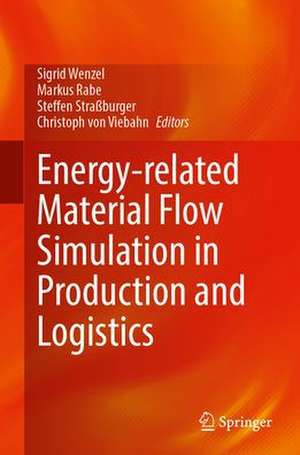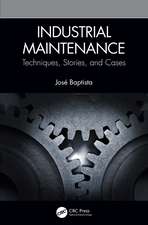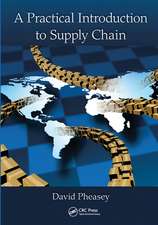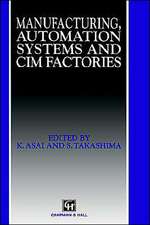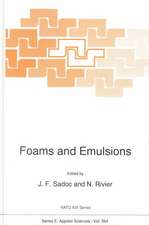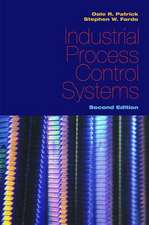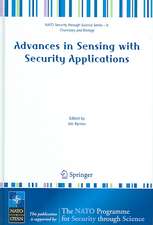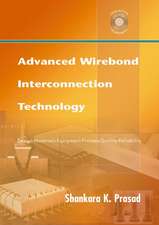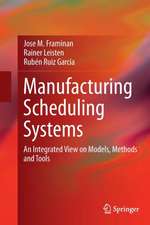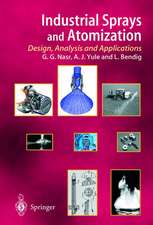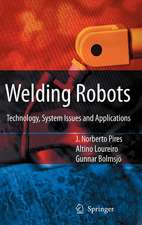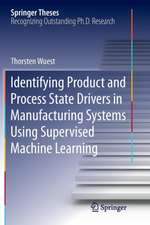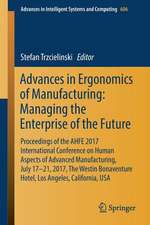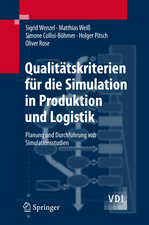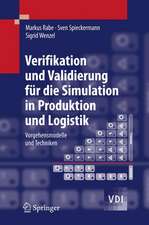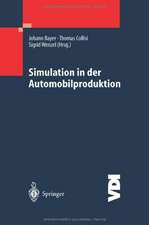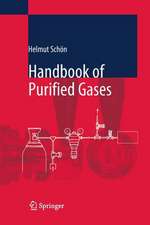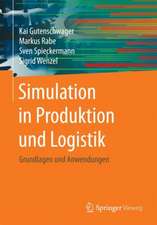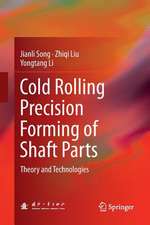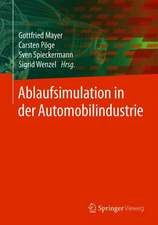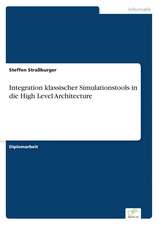Energy-Related Material Flow Simulation in Production and Logistics
Editat de Sigrid Wenzel, Markus Rabe, Steffen Strassburger, Christoph von Viebahnen Limba Engleză Hardback – 15 dec 2023
This book provides for the first time an overview on the current approaches and applications of energy aspects in production and logistics by the use of simulation techniques. During the last decade, the importance of energy in the material flow processes has become more and more important. The pressure to reduce the environmental footprint of production and logistics systems will even intensify in future. Therefore, enterprises have started to integrate the use of energy into their planning processes much more than before, even designing feedback loops, e.g., from energy control to production control. This receives additional attention with the increasing use of renewable, but less reliable, energy sources. Care must be taken to establish processes that aim to use energy when it is available. As an example, many industrial processes like melting or coating have significant energy demands, but could vary the point of time of its consumption within specific limits, leading to a very high complexity.
It discusses the construction and application of energy-specific performance indicators and analyzes the input information that needs to be acquired before implementing suitable models. On this basis, concrete technical solutions are introduced.
It discusses the construction and application of energy-specific performance indicators and analyzes the input information that needs to be acquired before implementing suitable models. On this basis, concrete technical solutions are introduced.
Preț: 894.46 lei
Preț vechi: 1090.81 lei
-18% Nou
Puncte Express: 1342
Preț estimativ în valută:
171.18€ • 176.83$ • 142.46£
171.18€ • 176.83$ • 142.46£
Carte disponibilă
Livrare economică 05-19 martie
Preluare comenzi: 021 569.72.76
Specificații
ISBN-13: 9783031342172
ISBN-10: 3031342178
Pagini: 203
Ilustrații: XIII, 203 p. 101 illus., 65 illus. in color.
Dimensiuni: 155 x 235 mm
Greutate: 0.54 kg
Ediția:1st ed. 2024
Editura: Springer International Publishing
Colecția Springer
Locul publicării:Cham, Switzerland
ISBN-10: 3031342178
Pagini: 203
Ilustrații: XIII, 203 p. 101 illus., 65 illus. in color.
Dimensiuni: 155 x 235 mm
Greutate: 0.54 kg
Ediția:1st ed. 2024
Editura: Springer International Publishing
Colecția Springer
Locul publicării:Cham, Switzerland
Cuprins
Classification, input data, and key performance indicators.- Manufacturing.- Automotive.- Transportation.- Retail.- Perishables.- Renewables.
Notă biografică
Markus Rabe is a full professor for IT in Production and Logistics (ITPL) at TU Dortmund University. Until 2010, he had been with Fraunhofer IPK in Berlin as the head of the corporate logistics and processes department, head of the central IT department, and a member of the institute direction circle. His research focus is on information systems for supply chains, production planning, and simulation. Markus Rabe is a vice chair of the "Simulation in Production and Logistics” section of the simulation society ASIM, member of the editorial board of the Journal of Simulation, and member of several conference program committees and has chaired the ASIM SPL conference in 1998, 2000, 2004, 2008, and 2015, and is a local chair of the WSC’2012 in Berlin and proceedings chair of the WSC’18 and WSC’19. More than 220 publications and editions report from his work.
Steffen Straßburger is a professor at the Ilmenau University of Technology and head of the Group for Information Technology in Production and Logistics. Previously, he was the head of the "Virtual Development" department at the Fraunhofer Institute in Magdeburg, Germany, and a researcher at the DaimlerChrysler Research Center in Ulm, Germany. He holds a doctoral and a diploma degree in Computer Science from the University of Magdeburg, Germany. His research interests include distributed simulation, automatic simulation model generation, and general interoperability topics within the digital factory and Industry 4.0 context.
Christoph Von Viebahn is a professor for business informatics at the University of Applied Sciences Hannover. He is specialized in supply chain management and dynamic computer simulation. In 2016, he was elected regional group spokesman for Lower Saxony by the Bundesvereinigung Logistik (BVL) and has been awarded with the science award of Lower Saxony in 2022. Sigrid Wenzel is a professor and head of the Department of Production Organization and Factory Planning, deputy executive director of the Institute of Production Technology and Logistics, and the dean of the Faculty of Mechanical Engineering at the University of Kassel. In addition to this, she is a board director of the simulation society Arbeitsgemeinschaft Simulation (ASIM), spokesperson of the ASIM Section Simulation in Production and Logistics (SPL) as well as of the workgroup on the Investigation of Energy-related Influences in SPL, member of the advisory board of the Association of German Engineers Society of Production and Logistics (VDI-GPL), and head of the Committee Modeling and Simulation of the VDI-GPL.
Steffen Straßburger is a professor at the Ilmenau University of Technology and head of the Group for Information Technology in Production and Logistics. Previously, he was the head of the "Virtual Development" department at the Fraunhofer Institute in Magdeburg, Germany, and a researcher at the DaimlerChrysler Research Center in Ulm, Germany. He holds a doctoral and a diploma degree in Computer Science from the University of Magdeburg, Germany. His research interests include distributed simulation, automatic simulation model generation, and general interoperability topics within the digital factory and Industry 4.0 context.
Christoph Von Viebahn is a professor for business informatics at the University of Applied Sciences Hannover. He is specialized in supply chain management and dynamic computer simulation. In 2016, he was elected regional group spokesman for Lower Saxony by the Bundesvereinigung Logistik (BVL) and has been awarded with the science award of Lower Saxony in 2022. Sigrid Wenzel is a professor and head of the Department of Production Organization and Factory Planning, deputy executive director of the Institute of Production Technology and Logistics, and the dean of the Faculty of Mechanical Engineering at the University of Kassel. In addition to this, she is a board director of the simulation society Arbeitsgemeinschaft Simulation (ASIM), spokesperson of the ASIM Section Simulation in Production and Logistics (SPL) as well as of the workgroup on the Investigation of Energy-related Influences in SPL, member of the advisory board of the Association of German Engineers Society of Production and Logistics (VDI-GPL), and head of the Committee Modeling and Simulation of the VDI-GPL.
Textul de pe ultima copertă
This book provides for the first time an overview on the current approaches and applications of energy aspects in production and logistics by the use of simulation techniques. During the last decade, the importance of energy in the material flow processes has become more and more important. The pressure to reduce the environmental footprint of production and logistics systems will even intensify in future. Therefore, enterprises have started to integrate the use of energy into their planning processes much more than before, even designing feedback loops, e.g., from energy control to production control. This receives additional attention with the increasing use of renewable, but less reliable, energy sources. Care must be taken to establish processes that aim to use energy when it is available. As an example, many industrial processes like melting or coating have significant energy demands, but could vary the point of time of its consumption within specific limits, leading to a very high complexity.
It discusses the construction and application of energy-specific performance indicators and analyzes the input information that needs to be acquired before implementing suitable models. On this basis, concrete technical solutions are introduced.
Caracteristici
Investigates energy aspects in dynamics of logistics Analyzes the input information that needs to be acquired before implementing suitable models Presents sound theory as well as concrete solutions
